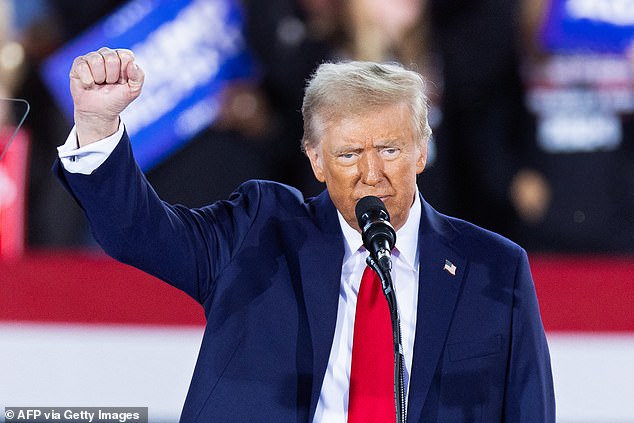Betting markets suggest the election will be officially called the day after polls close, despite widespread expectations that it will be one of the closest in history.
By wide margins on betting sites, bettors Polymarket and Kalshi choose Wednesday, November 6 as the date on which the Associated Press will make the decision.
In 2020, it took four days for the Associated Press to announce that Joe Biden had won.
It comes as Donald Trump is rising again in the betting markets after his odds plummeted following a surprise poll in Iowa.
Donald Trump raises his fist as he speaks during a campaign rally at the JS Dorton Arena in Raleigh, North Carolina, on November 4, 2024.
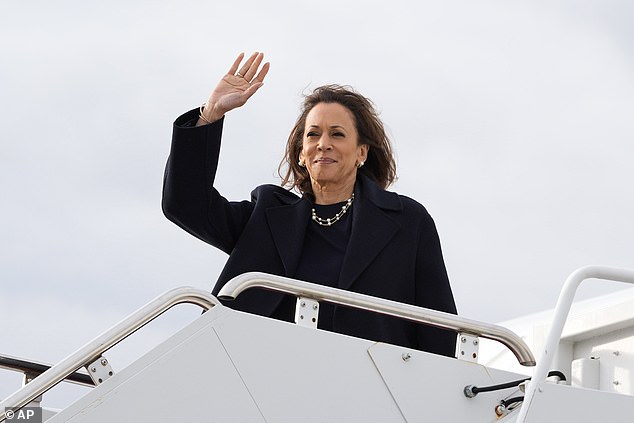
Democratic Vice Presidential candidate Kamala Harris waves as she boards Air Force Two at Oakland County International Airport in Waterford Township, Michigan, Sunday, Nov. 3, 2024, en route to Lansing, Michigan.
A Des Moines Register poll released over the weekend showed him trailing Kamala Harris by three points in the traditionally conservative state.
That led to Trump’s odds in the betting and prediction markets plummeting.
His lead over Harris on betting site Polymarket dropped to seven points at the weekend, but rose again to 18 points on Monday.
Polymarket has accepted more than $3 billion in bets on who will win the election.
In the Kalshi betting market, where Harris briefly led Trump over the weekend, Trump reached a 10-point lead on Monday.
The site Predictit saw Harris leading by two points on Monday afternoon, having risen as much as eight points over the weekend.
BetVictor data showed an avalanche of bets on Harris over the weekend, with 80 percent of all bets after the Iowa poll directed at the Democrat.
Spokesman Sam Boswell said: “The rollercoaster race to the White House took another big turn over the weekend, and Kamala Harris saw her chances reduced.”
But he said it was “the closest election race we’ve seen in recent memory” and that “the market has balanced itself once again.”
The former president had been rising for some time on various betting platforms, but the money started flowing to Harris earlier this week.
Then on Saturday, the Des Monies Register poll showed Harris leading Trump 47 to 44 percent among likely voters.
Ann Selzer, who conducted the poll, has earned a reputation as “Iowa poll queen” and the “best pollster in politics” over decades conducting Des Moines Register polls.
Iowa hasn’t voted for a Democrat in a presidential election since Barack Obama in 2012, and Harris’ campaign dismissed it as an easy GOP victory this time around.
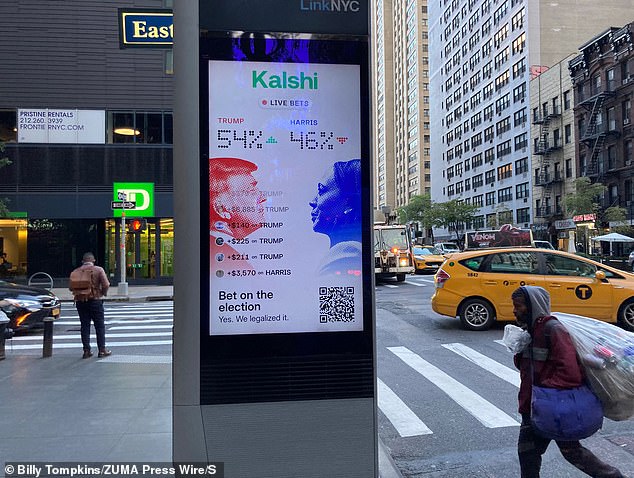
Live election betting at a digital screen kiosk on a New York City street
Before the Iowa poll was released, Trump was already falling in the betting markets.
Between October 29 and November 1, his odds at bookmakers Bet365 and Paddy Power fell from 66.7 per cent to 63.6 per cent.
In the Real Clear Politics betting market average earlier this week, Trump had led Harris by as much as 60.6 percent to 38.1 percent.
Polls put the election on a knife-edge and essentially tied, but for weeks betting markets have consistently given Trump a clear lead.
They began to fall on October 27 after a comedian at Trump’s rally in New York’s Madison Square Garden made a derogatory joke about Puerto Rico, sparking widespread backlash.
Kalshi, which is the first legal online election prediction betting platform in the United States, has already received more than $200 million in bets for the 2024 race.
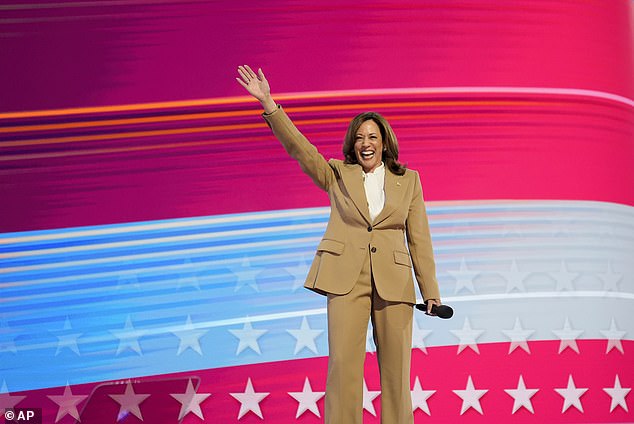
Kamala Harris was far behind in the betting markets
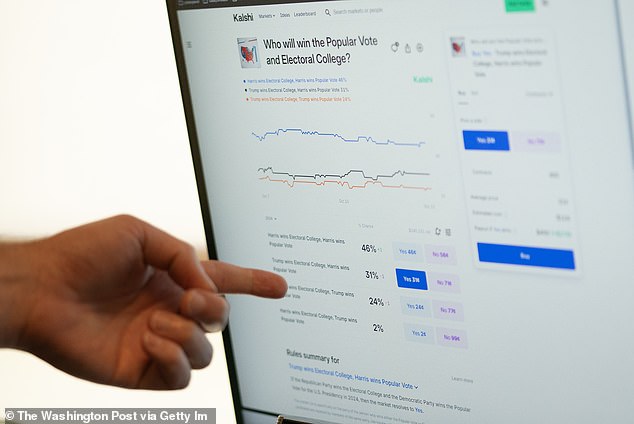
A bettor makes his decision on the elections.
Last week, Tarek Mansour, its chief executive, said bettors are a more accurate indication of the outcome than polls because they have “skin in the game.”
He told DailyMail.com: ‘We should definitely trust the (betting) markets.
‘Prediction markets are places where people have money at stake. People don’t lie with their money.
In 2016 the polls indicated that Hillary Clinton would easily defeat Trump, but they were wrong.
In the past, betting markets have proven successful in predicting the outcome of elections.
However, like the polls, they were not a good indicator in 2016.
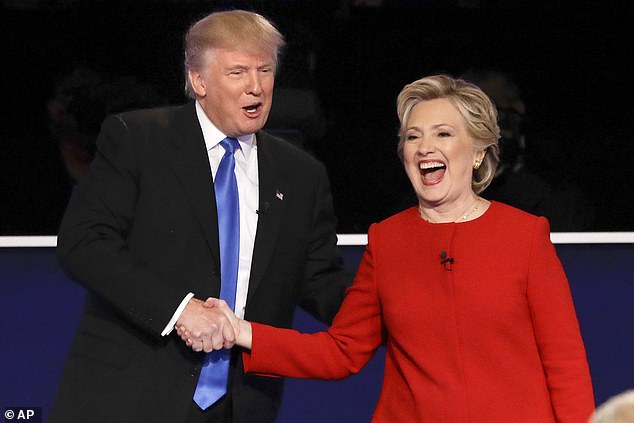
Republican presidential candidate Donald Trump and Democratic presidential candidate Hillary Clinton shake hands after the presidential debate in Hempstead, New York, on September 26, 2016.
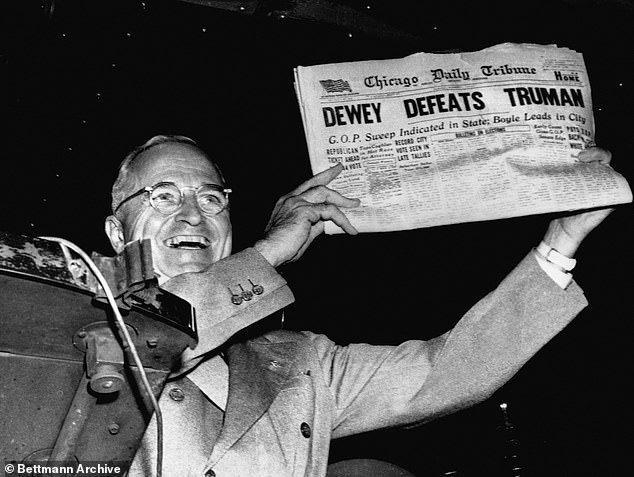
the betting markets were wrong in 1948, when President Harry S. Truman won; Here, he gleefully displays a premature first edition of the Chicago Daily Tribune from his train in St. Louis, Missouri, after his defeat of Thomas E. Dewey.
As early as 1924, the Wall Street Journal wrote: “Betting odds are generally considered the best indicator of likely results in presidential campaigns.”
At that time, betting houses sent people to candidates’ speeches and based their odds on how the public responded, according to the newspaper.
In 15 presidential elections between 1884 and 1940, there was only one upset because the bookmakers were wrong, according to a study by economists Paul Rhode and Koleman Strumpf.
However, in 1948 the betting markets, like the polls, went spectacularly wrong when they gave President Harry Truman only about a one in ten chance of winning.


